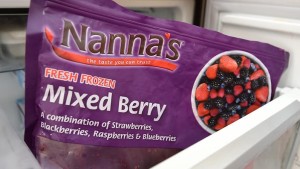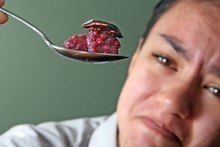State-sponsored jazz got something right: food safety for produce starts at the farm.
Nancy Shute of NPR reports the Centers for Disease Control and Prevention that at least 49 people in seven states have gotten Hepatitis A from eating organic frozen berries.
Hepatitis A in frozen berries is not a new problem — though most recorded outbreaks have been small. Way back in the 1980s people got the same virus  from frozen raspberries used to make mousse in Scotland. A 2003 outbreak in New Zealand was traced to a single blueberry farm. Finland banned serving uncooked berries in institutional settings after multiple outbreaks in the late 1990s.
from frozen raspberries used to make mousse in Scotland. A 2003 outbreak in New Zealand was traced to a single blueberry farm. Finland banned serving uncooked berries in institutional settings after multiple outbreaks in the late 1990s.
Canada also has a hepatitis A outbreak caused by frozen berries. One last year in British Columbia came from a frozen berry blend with pomegranate seeds from Egypt.
Pomegranate seeds are also in the berry blend fingered in the new outbreak. According to the label, the berries were a cosmopolitan bunch — from the U.S., Argentina, Chile and Turkey. The manufacturer, Townsend Farms Inc. of Fairview, Ore., issued a recall notice yesterday. The berries were sold through Costco and Harris Teeter stores.
Growers and processors should be screening workers for symptoms of hepatitis A, says Juan Silva, a professor of food technology at Mississippi State  University. He says they also should be requiring good hygiene either through hand-washing or wearing gloves.
University. He says they also should be requiring good hygiene either through hand-washing or wearing gloves.
“You need constant training and awareness for supervisors and employees that they can cause this kind of problem,” Silva says. “Try to make them realize that they are responsible for the safety of people who eat the food.”
Cooking or pasteurizing food is one of the only reliable ways to kill the hepatitis A virus, Silva says. So you’ll probably be safe if you’re planning to make pie or cobbler.
But antimicrobial rinses haven’t proven to kill enough germs on fresh fruit to be worth their while. Irradiation kills bacteria, but it’s much harder to zap viruses, so that’s not a sure bet, either. And freezing food doesn’t kill the germs, alas. That’s how scientists keep the bacteria they study frisky.
“There’s no post-harvest intervention as of now that’s capable of eliminating the virus,” Silva told The Salt. “That’s why prevention is key.”
So what’s a smoothie lover to do?
No one’s suggesting getting vaccinated just to make smoothies, but as more and more people gain protection from the vaccine, outbreaks like these will pose less of a risk.
 Patties Foods sent about 360 packs of recalled and non-recalled frozen berries for testing at accredited viral laboratories in Europe, North America and Australia, but neither hepatitis A norE. coli was detected in any sample.
Patties Foods sent about 360 packs of recalled and non-recalled frozen berries for testing at accredited viral laboratories in Europe, North America and Australia, but neither hepatitis A norE. coli was detected in any sample.




 (right, pic from APN) were having cereal and boysenberries for breakfast on Wednesday when they made the stomach-turning discovery.
(right, pic from APN) were having cereal and boysenberries for breakfast on Wednesday when they made the stomach-turning discovery.